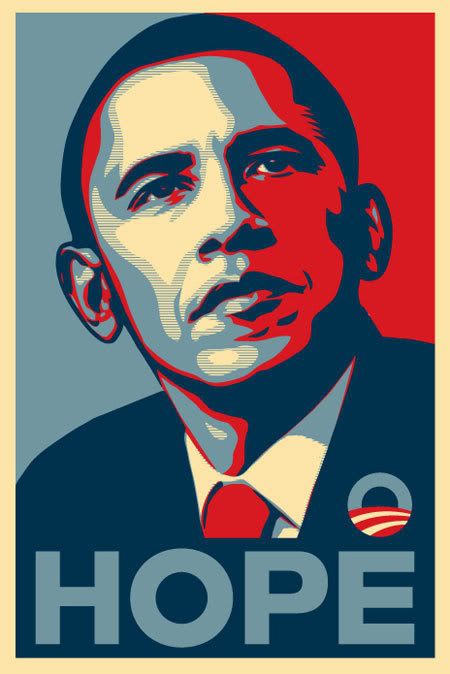Hope poster artist sued, arrested

 News of the weird. First Obama poster artist Shepard Fairey is sued by AP for copyright infringement for using a wire service photo as a model for his artwork (a particularly obnoxious assertion of copyright: if painting from a photo is copyright infringement, why doesn't AP sue the estate of Andy Warhol?). Fairey and Stanford's Fair Use Project just filed for declaratory relief that the painting is fair use (complaint is here [PDF]).
News of the weird. First Obama poster artist Shepard Fairey is sued by AP for copyright infringement for using a wire service photo as a model for his artwork (a particularly obnoxious assertion of copyright: if painting from a photo is copyright infringement, why doesn't AP sue the estate of Andy Warhol?). Fairey and Stanford's Fair Use Project just filed for declaratory relief that the painting is fair use (complaint is here [PDF]).
Friday, Fairey was arrested while in Boston on an old warrant for graffiti! The Boston Globe reports:
In the days leading up to Friday night's opening, Boston Detective Bill Kelley said, he was getting more and more complaints from residents of the Back Bay, the North End, and Mission Hill, furious that a man who admitted to spreading graffiti - even bragged about it - was being treated like a celebrity instead of a criminal.On Friday night, Kelley ended a stakeout by pulling Fairey's taxicab to the side of a Boston street and arresting him on an outstanding warrant on an old graffiti charge from 2000 as the artist was on his way to the Institute of Contemporary Art in South Boston.
Rather than being feted by the hoi polloi, Fairey spent his day in court, dealing with accusations of tagging Mass. Turnpike Authority property on Jan. 24, and committing five other acts of vandalism over the years. He faces up to two years in jail, fines and suspension of his driver's license.
So, is it art or crime? Copyright violation or fair use? In both cases, Fairey says, the powers that be are "suppressing an artist's freedom of transformative expression." The city and the AP think they have property to protect. I doubt the AP will prevail, but there's no fair use of real property -- regardless of the quality of the tagging. I would think such a high visibility case would mean some kind of settlement in which the artist gives something back to the community. I don't think he'll be scrubbing walls, though.